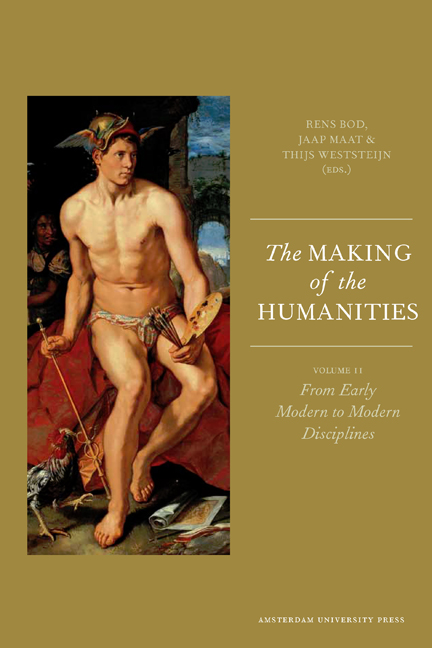Book contents
- Frontmatter
- Contents
- Introduction: The Dawn of the Modern Humanities
- I Linguistics and Philology
- II The Humanities and the Sciences
- III Writing History and Intellectual History
- IV The Impact of the East
- V Artworks and Texts
- VI Literature and Rhetoric
- VII Academic Communities
- Contributors
- List of Figures
- Index
The Documents of Feith: The Centralization of the Archive in Nineteenth- Century Historiography
Published online by Cambridge University Press: 19 January 2021
- Frontmatter
- Contents
- Introduction: The Dawn of the Modern Humanities
- I Linguistics and Philology
- II The Humanities and the Sciences
- III Writing History and Intellectual History
- IV The Impact of the East
- V Artworks and Texts
- VI Literature and Rhetoric
- VII Academic Communities
- Contributors
- List of Figures
- Index
Summary
In his grand overview of the history of the humanities, De vergeten wetenschappen (‘The Forgotten Sciences’), Rens Bod takes as his theme the continuous search for empirical patterns and methodical principles. The book shows a wide array of remarkable similarities and cross-sections between the humanities. Nineteenthcentury historiography, for example: its stress on the critical use of primary sources owed a lot to philology and it shared its search for quite rigid methodology with linguistics and, again, philology. Less prominent in Bod's book but perhaps most strikingly similar between the humanities was – quite paradoxically – their stress on mutual differences. The humanities established themselves as (academic) disciplines by demarcating themselves from predecessors, amateurs and neighbouring disciplines. These demarcations should be an object of investigation themselves; although method played an important role in their fixation, they cannot be explained by it alone.
Places, physically and symbolically, had an important role in shaping nineteenth- century disciplines. Historians of the natural sciences have often studied the geography of science on a macro- and a micro-scale. They have long found out what remains to be researched in the humanities, namely that ‘space matters’. Laboratories and fieldwork are places crucial to the formation of a discipline or the construction of scientific knowledge. An analogy can be made with the humanities. In the frame of this article I will narrow it down to historiography. When the critical-philological method was set as the historian's strict procedure, primary sources turned out to be his raw material. The archive consequentially became his privileged working place. Kasper Risbjerg Eskildsen has recently taken inspiration from the history of science and studied the ‘archival turn’ of Leopold Ranke, probably the nineteenth-century historian with the greatest intellectual legacy and offspring. Eskildsen has shown how Ranke made the archive into ‘the most important site for historical knowledge’. After Ranke had set the example, no history could be written without a foundation of documentary evidence coming from the archive. History students were trained to become archival researchers. This training did not necessarily entail an actual archival visit, since the seminar room could serve as a substitute. Yet, the result was clear: the archive was part of the disciplinary identity of the historian.
- Type
- Chapter
- Information
- The Making of the HumanitiesVolume II: From Early Modern to Modern Disciplines, pp. 357 - 376Publisher: Amsterdam University PressPrint publication year: 2012



